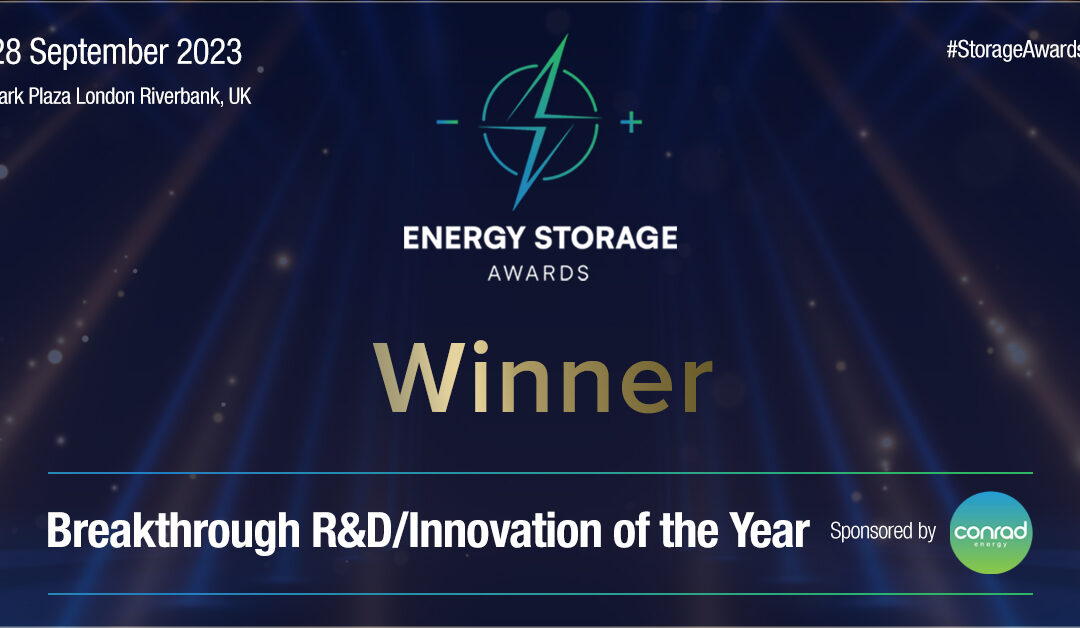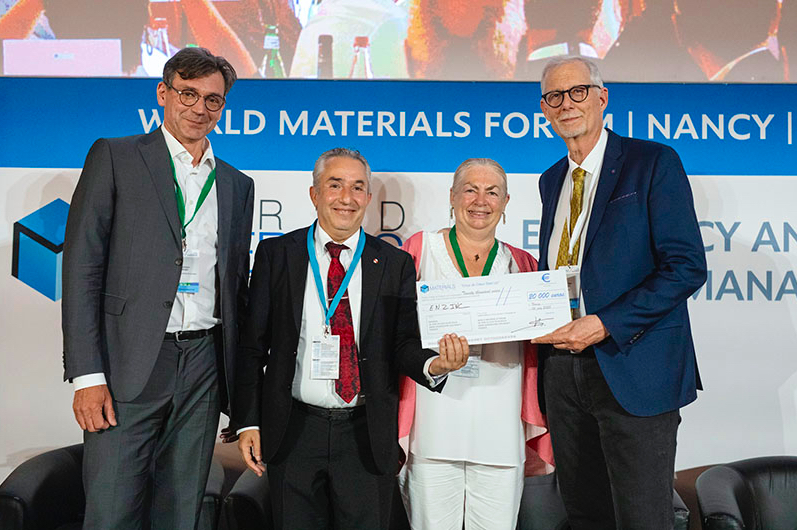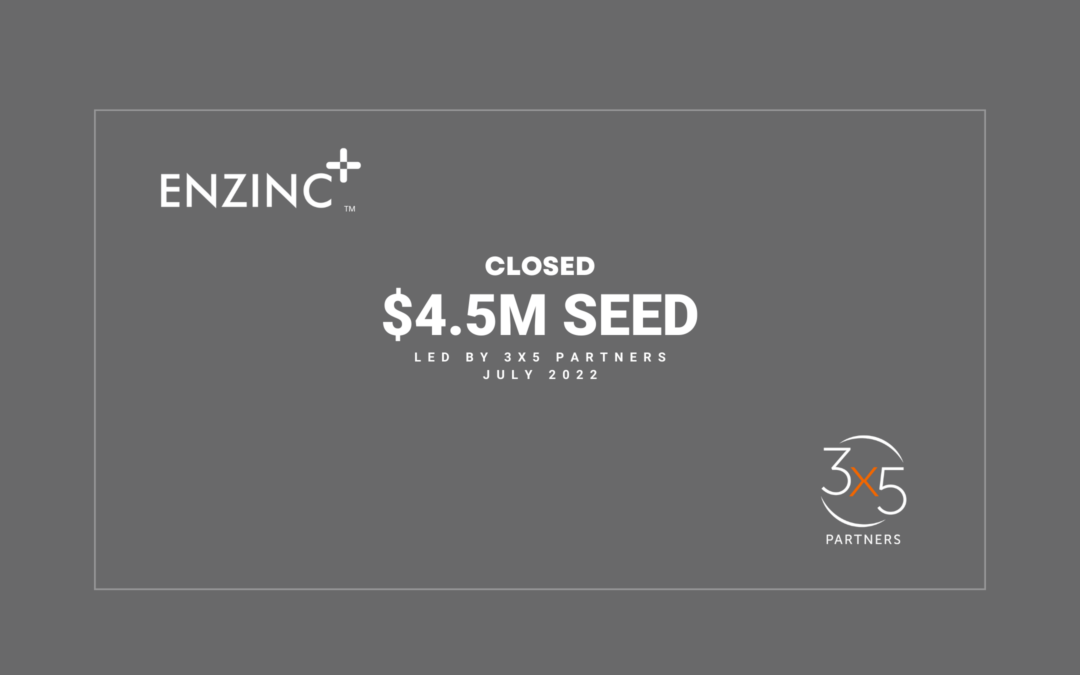
by Enzinc Marketing | Oct 2, 2023 | Press Release
Richmond, Calif. – October 2, 2023 — Enzinc, a pioneering developer of advanced rechargeable zinc battery technology, today announced it is the recipient of the Energy Storage Award for Breakthrough Research and Development (R&D)/Innovation of the Year. This prestigious accolade is a testament to the company’s groundbreaking efforts and contributions to advancing energy storage technology.
The Energy Storage Awards are organized by Solar Media, publisher of the energy storage industry website Energy-Storage.News and host of the Energy Storage Summit series. A panel of 12 judges, comprised of distinguished experts from various sectors of the energy storage field and academic institutions, evaluated nominees for this year’s awards.
“I’m immensely proud of the Enzinc team and this extraordinary achievement, and extend my gratitude to the judges for recognizing the role we are playing in fundamentally reshaping the energy storage arena,” said Michael Burz, Enzinc founder and CEO. “By harnessing the power of zinc, we are driving innovation in energy storage, with the ultimate goal of shaping a sustainable and resilient future.”
Enzinc’s innovation allows zinc-based batteries to deliver unparalleled performance, offering three times the energy output and cycle life compared to traditional batteries. By eliminating battery-killing dendrites, its proprietary zinc anode technology is a game-changer resulting in the creation of superior batteries suitable for both mobile and stationary applications. With Enzinc’s technology at its core, a wide range of applications, from urban electric vehicles to home and grid energy storage systems, can harness the benefits of safe, energy-dense and easily recyclable nickel-zinc batteries.
What sets Enzinc apart is its innovative go-to-market approach – allowing for cost-effective adaptation of existing NiCad, NiMH and lead-acid factories to produce premium batteries infused with Enzinc innovation. This transformation enables these factories to leverage their worldwide manufacturing capacity of more than 400 GWh, effectively tripling their capacity. With this scaling capability, Enzinc and its partners stand ready to meet the ever-growing demand for energy storage solutions, offering a secure, economically recyclable alternative to lithium-based batteries. Notably, zinc, as the fourth most mined metal globally, offers countries a resilient alternative to lithium-dominated supply chains.
Enzinc’s innovative breakthrough is underpinned by the unique attributes of the zinc sponge structure:
- Elimination of Dendrite Growth: Significantly increases cycle life.
- Higher Surface Area: Provides specific energy and energy density equivalent to LFP batteries at the cell level and NMC at the systems level.
- Cathode Agnostic: Can be coupled with nickel, manganese, silver and carbon cathodes.
In recognition of its outstanding contributions, Enzinc has also received several other prestigious awards, including the Keeling Curve Award 2022, the Global Automotive Mobility and Innovation Challenge 2022 from the Society of Automotive Engineers, and the Coup de Cœur 2023 Startup Challenge by the World Materials Forum.
Based in California, Enzinc has received four out of five Electric Program Investment Charge (EPIC) Program grants from the California Energy Commission and, in 2022, closed a $4.5 million seed round led by Portland-based 3×5 Partners.
About Enzinc
Enzinc is a battery technology leader bringing the most powerful zinc-based battery to market. The company’s innovative zinc material enables established lead-acid battery manufacturers to triple their output and substantially improve their margins. Enzinc’s groundbreaking proprietary technology eliminates failure points and mitigates risks in the supply chain, resulting in superior batteries for mobile and stationary applications. Enzinc is based in California and has received awards from ARPA-E and the California Energy Commission to further its battery innovation, and raised a $4.5 million seed round in 2022. Find out more at enzinc.com, LinkedIn, YouTube and Twitter.
PR Contact:
Leah Wilkinson
Wilkinson + Associates
[email protected]
703-907-0010

by Enzinc Marketing | Jul 8, 2023 | Press Release
Advanced technology repurposes existing lead acid manufacturing infrastructure to expedite the deployment of better batteries
RICHMOND, Calif.: Enzinc, a pioneering developer of advanced rechargeable zinc battery technology, was awarded the prestigious Coup de Coeur prize in the World Materials Forum (WMF) Start Up Challenge for its innovative way of using a common material to create powerful batteries. A platform for entrepreneurs to showcase their groundbreaking solutions that use materials smarter, more efficiently or longer, the ninth WMF is taking place in Nancy, France, this week. The event brings together industry leaders, experts and innovators from around the world.
The demand for high-power batteries is substantial, but the industry’s growth is hindered by materials shortages. Enzinc is revolutionizing the energy sector by redefining what’s achievable, offering breakthrough zinc battery technology to overcome obstacles and drive progress in the energy storage sector. Its cutting-edge technology surpasses traditional lead-acid batteries by delivering three times the energy output and cycle life and offers twice the energy density of any other zinc battery. Its high-performance solution excels in both mobility and stationary applications.
“We are incredibly honored to receive the Coup de Coeur Start Up Award, a resounding validation of our groundbreaking technology and the unwavering dedication of our team towards fostering innovation,” said Michael Burz, Enzinc founder and CEO. “Enzinc is at the forefront of material innovation, and our drop-in zinc microsponge anode is transforming the battery industry. With Enzinc inside, users can sustainably power anything from short and mid-range electric vehicles to stationary storage systems. Our proprietary zinc battery technology eliminates traditional failure points and supply chain risks, offering superior batteries with higher margins, increased power and enhanced safety.”
The company is positioned to meet the growing demand for battery storage in areas where existing solutions face significant challenges. Considering the limitations associated with lithium, a market valued at $70 billion, and the power delivery shortcomings of lead-acid batteries worth $40 billion, Enzinc’s cutting-edge technology fills the gap and provides a solution for modern applications.
Enzinc has secured four out of five Electric Program Investment Charge (EPIC) Program grants from the California Energy Commission and, in 2022, closed a $4.5 million seed round led by Portland-based 3×5 Partners.

by Enzinc Marketing | Jul 25, 2022 | Press Release
Advanced zinc battery developer Enzinc has closed a $4.5 million seed round led by Portland-based 3x5 Partners.
RICHMOND, Calif.: Enzinc Inc., an advanced zinc battery developer, has closed a $4.5 million seed round led by Portland-based 3×5 Partners. Enzinc was founded with a mission to accelerate the energy transition with safe, sustainable and rapidly-scalable technologies. It is developing high-powered zinc batteries for mobility and stationary uses
“We were as impressed by Enzinc’s business model as we were by its groundbreaking technology,” said 3×5 Partner’s Managing Director, Nicholas Walrod. “Not only are its batteries built using readily-available zinc, solving supply chain issues, but also it will be able to rapidly scale production by leveraging existing lead acid manufacturing plants around the globe.” The team at 3×5 Partners strives to ‘invest in what the world needs’ by partnering with promising companies whose technology offer real solutions in the climate and healthcare sectors.
The capital raise will allow the team at Enzinc to finalize its prototype testing and automated anode production line design for powerful mobility and long-duration stationary nickel zinc batteries.
“It’s crucial that the supply of batteries keep up with the demand coming from electrifying buildings, transportation and the grid. We have to diversify the types of batteries used and not risk betting the whole energy transition on a single chemistry such as lithium ion,” said Michael Burz, founder and CEO of Enzinc. “The team at 3×5 Partners bring a depth of expertise in growing innovative firms, and we are pleased to partner with them.”
Enzinc’s microsponge anode solves the challenges that have limited zinc’s potential as a rechargeable battery material. Batteries manufactured by today’s leading lead acid brands with the ‘Enzinc Inside’ drop-in technology will have the power of lithium at the cost of lead acid, with no fire potential or HVAC requirement and a wide temperature operating range. They will use abundant and recyclable minerals and create local manufacturing jobs, offering superior energy storage for mobility and stationary applications.
The announcement follows Enzinc being awarded $1.8 million under the Bringing Rapid Innovation Development to Green Energy, or BRIDGE, grants through the California Energy Commission (CEC) Electric Program Investment Charge (EPIC) program.

by Enzinc Marketing | Apr 27, 2022 | Press Release
Advanced technology repurposes existing lead acid manufacturing infrastructure to expedite the deployment of better batteries
RICHMOND, Calif.: Enzinc Inc., an advanced rechargeable zinc battery developer, was selected for a competitive $1.8 million California Energy Commission (CEC) BRIDGE award to further develop its zinc batteries for stationary and mobility uses. After approval, the proceeds, along with $1.0 million of matching funds, will be used to design and test a long duration stationary battery and build out a pilot anode manufacturing line.
“If we are to electrify everything, we need batteries that use easily-sourced materials and can be scaled rapidly. Being selected for BRIDGE shows the rising awareness that we can’t place all of our energy storage bets on lithium technologies,” said Michael Burz, founder and CEO of Enzinc. “Today’s $60 billion lead-acid battery market can play a larger role in the energy transition by converting existing factories to use Enzinc’s drop-in technology and make more powerful, higher margin and longer lasting batteries.”
Batteries with Enzinc’s zinc microsponge anode’s safe, non-flammable materials will make it ideal for stationary energy storage inside homes and commercial buildings and adjacent to critical energy infrastructure. Additionally, it will be ideal for mobility including e-bikes, e-scooters, electric delivery vehicles and other electric vehicles with moderate ranges, as well as be able to replace the lead acid battery that all vehicles use for starter motors and other systems.
“The EPIC programs available at each stage of a clean energy company’s development and commercialization are creating a vibrant and innovative industry in California,” Burz said. “We are honored to have been a recipient of these vital awards at key points in our company’s growth and to be selected for BRIDGE.”
The Bringing Rapid Innovation Development to Green Energy, or BRIDGE, awards are funded by the Electric Program Investment Charge (EPIC) program, which will grant up to a total of $57.3 million over four rounds. Enzinc and four other companies were selected for the proposed final round of funding, contingent on final approval at a CEC business meeting.
Previously, Enzinc has received CalSEED Phase I and II awards, together worth $600,000, and a $292,000 CalTestBed voucher for product testing. The selection follows Enzinc’s announcements that it has formed an Industry Advisory Group with global leaders in battery production, use and recycling, and that it won the Global Automotive and Mobility Innovation Challenge, GAMIC, at the SAE International World Congress Experience.

by Enzinc Marketing | Jan 17, 2022 | Press Release
Enzinc names key teaming partners for advanced zinc battery testing through the CalTestBed program
RICHMOND, Calif.: Enzinc Inc., an advanced battery technology developer bringing rechargeable zinc batteries to market, announced today that it has teaming agreements in place with leading energy companies for its third-party product testing. The testing is being done at University of California Riverside’s facilities through a CalTestBed award valued at $292,000.
The teaming partners include power backup provider to the global telecom industry BASE Technologies, EV charging SaaS company ChargeNet Stations, as well as a global battery manufacturer, a leading electric bike brand, and an international waste and recycling provider, which are teaming with Enzinc confidentially.
“It’s a vote of confidence in this technology’s potential that a number of companies are teaming with Enzinc during its testing phase,” said Danny Kennedy, chief energy officer of New Energy Nexus. “We’re thrilled that our programs are giving startups like Enzinc a leg up to innovate the way batteries are manufactured and deployed. We need to see more of this if we’re to accelerate the clean energy transition and electrify our economy.”
“Our teaming partners will ensure that our battery’s testing protocols reflect many of the use cases expected for advanced batteries with ‘Enzinc Inside’,” said Michael Burz, Enzinc founder and CEO. “The CalTestBed award will enable us to test how batteries with our exclusive zinc microsponge anode perform in key applications including e-bikes and other electric mobility, stationary power back up, and grid-tied and microgrid energy storage.”
Enzinc has been awarded a voucher near the maximum $300,000 value, which enables Enzinc to work with the expert team at U.C. Riverside’s battery testing facility. The third-party testing program both ensures Enzinc’s advanced battery design will be shaped by real world needs and demonstrates each partner’s commitment to innovation.
Rebecca Wolkoff, CTO at ChargeNet, looks forward to testing their software with the Enzinc hardware, “We are both committed to creating safe, affordable and sustainable energy storage. We appreciate that our ChargeNet team can provide guidance and feedback on the application of Enzinc’s technology.”
The competitive CalTestBed initiative is funded through California Energy Commission’s Electric Program Investment Charge (EPIC) program to speed the commercialization of clean energy technologies. It funds third-party testing at world-class facilities at nine University of California campuses and one national laboratory. The program is led by New Energy Nexus in partnership with the University of California Office of the President (UCOP) and the Lawrence Berkeley National Laboratory.
Enzinc’s zinc micro sponge anode will power a family of high-performance rechargeable batteries. The anode’s structure allows the battery to provide more than three times the energy and have three times the lifespan of lead acid batteries while costing about the same, and it operates through a wider temperature range than lithium-based batteries. The battery is totally recyclable, much safer to use than either lead- or lithium-based batteries and uses zinc, a common material with no supply chain constraints.
This comes after the recent announcement that former president of Robert Bosch GmbH’s Powertrain Solutions Division and chief of its Progressive Mobility Players team, Stefan Seiberth, joined Enzinc’s senior advisory team.





